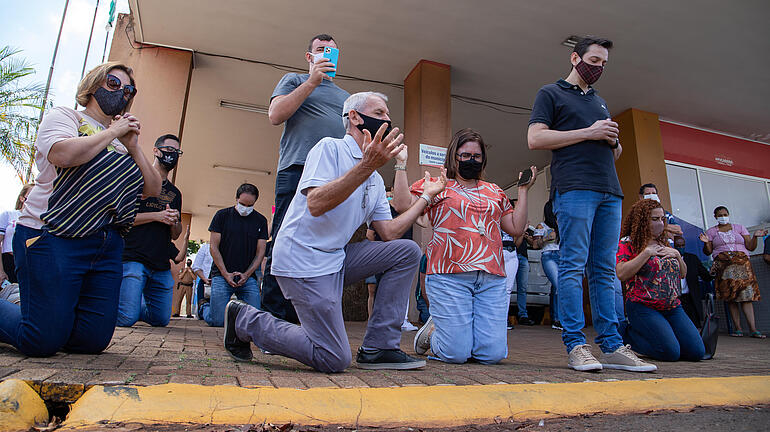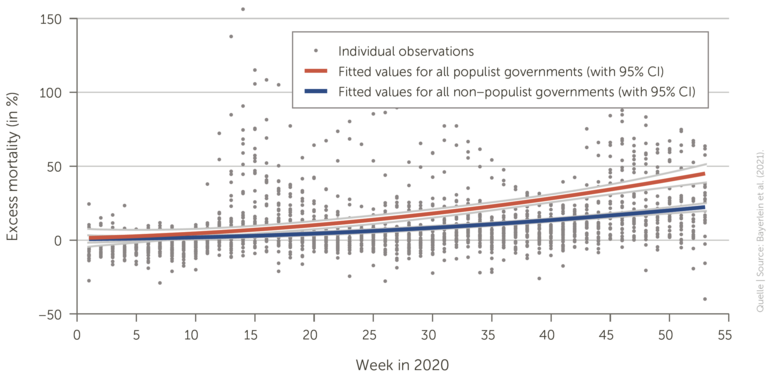Kiel Institute Highlights
Populist Politics increase excess mortality in pandemic
The COVID19 pandemic posed immense challenges in terms of public policy for governments around the world. Lockdowns were imposed on an unprecedented scale, restricting the mobility of citizens. However, the speed and scope of governmental reactions varied widely across the globe. This inevitably raises the question as to whether the political orientation of the government plays a part in the speed of implementation and scope of antipandemic measures.

Several studies have compared the responses of democratic and autocratic regimes, some arguing that autocracies like China were better able to handle the pandemic. However, contributions that look at the performance of populist governments in the pandemic are still scarce. We addressed this research gap and found that populist governments systematically mishandled the pandemic by providing inadequate policy responses and reducing public compliance with public health recommendations, both of which led to a higher mortality among the population.
Populism and its role in the pandemic
In the seminal contribution by Mudde (2004, p. 543), populism is defi ned as a thin ideology that considers society to be “separated into two homogeneous and antagonistic groups, ‘the pure people’ versus ‘the corrupt elite,’ and which argues that politics should be an expression of the volonté générale (general will) of the people.” Consequently, populist governments are oft en elected on “anti-elite” platforms following prolonged periods of economic stagnation paired with rising inequality alongside the cultural backlash against new immigration patterns and liberal values in general.
Populist politics purportedly espouse the “general will” of the ordinary citizen as opposed to elite interests. This makes such regimes suspicious of scientific and “expert” advice, which had seriously adverse consequences following the onset of the pandemic. Populist leaders are prone to disseminate misinformation, which can make the public dismissive of the gravity of the pandemic. The citizenry may react to this by adopting fewer prudential measures, such as social distancing. Populist-run states are also more reluctant to impose lockdowns and restrict mass gatherings, as well as citizen mobility more generally.
The purpose of our article is to examine empirically if populists in government genuinely mishandled the COVID-19 pandemic in 2020, before vaccination campaigns got under way. The sample comprised 42 developed and developing countries, of which 11 were populist-governed in 2020 (see Funke et al., 2020; Rooduijn et al., 2019). We analyzed systematic differences in policy responses as well as citizen behavior and linked these differences to higher excess mortality in populist-governed countries, based on weekly data.
Average excess mortality during 2020 with fitted values

We measured the severity of the pandemic by using country-specific excess mortality. This is the number of fatalities that occur additionally to the deaths that would have been expected under normal conditions. We obtained the total and expected deaths for the individual weeks in 2020 from various sources listed in Bayerlein et al. (2021). To analyze excess mortality over time, the figure plots excess mortality for 2020. The figure plots the individual excess mortality (grey circles) and quadratic fitted mortality aggregated by populist (red) and non-populist-governed (blue) countries (with a 95 percent confidence interval around the fitted lines). The figure shows that average excess mortality in populist-governed countries is systematically higher than in the non-populist countries.
We measured the official policy response to the COVID-19 pandemic using data from the Oxford COVID-19 Government Response Tracker (Hale et al., 2021). Since we are interested in the specific government response adopted to contain the pandemic and protect the population, we employed the containment and health index, which gives an aggregated response value for containment and health policies. The index ranges from 0 (no measures taken) to 100 (all measures taken). We adjusted this index for democratic backsliding, effectively eliminating politically autocratic measures that did not deal directly with the pandemic but were enacted to undermine democratic institutions (Kolvani et al., 2020).
Turning to citizen behavior, we measured it by utilizing the comprehensive data from the Google Mobility Report (Google, 2021). The report is broken down by location and shows how the number of visits to places such as grocery stores and parks diverged from the baseline between February 7 and December 31, 2020. Because citizen mobility is contingent on the actual spread of the virus, it has to be placed into context with that spread. In doing so, we very clearly found that citizen mobility is higher in populist-governed countries for similar infection rates. While mobility dropped in the non-populist-governed countries, especially in the middle of 2020, relative mobility increased in populist-governed countries over the course of 2020.
Running several econometric models and controlling for various country-specific factors, we demonstrated that changing from non-populist to populist governments is associated with a predicted excess mortality increase of about 8 percentage points. Breaking down the numbers, this means that excess mortality—the number of deaths above the level that would have been expected even without the pandemic—is a good 8 percent in non-populist-led countries and almost 18 percent in populist-led ones. Thus, for an otherwise 100 deaths, the COVID-19 pandemic causes 8 additional deaths in non-populist-led countries and 18 additional deaths in populist-led countries, more than twice as many. On average for all countries considered, excess mortality is 10 percent—instead of 100 deaths otherwise, the pandemic causes 110 deaths.
In conclusion, excess mortality is systematically higher in populist-governed countries after controlling for variation between countries.
Further, we showed that populist-governed countries display lower policy response scores and higher citizen mobility, which again are correlated with higher levels of excess mortality.
Related Publication
References:
Bayerlein, M., et al. (2021). Populism and COVID-19: How Populist Governments (Mis)Handle the Pandemic. Journal of Political Institutions and Political Economy, 2 (3): 389–428.
Funke, M., M. Schularick und C. Trebesch (2020). Populist Leaders and the Economy. Tech. rep. ECONtribute Discussion Paper.
Google (2021). Google COVID-19 Community Mobility Reports. Accessed on 06/15/2021. URL: https://www.google.com/covid19/mobility/
Hale, T., et al. (2021). A Global Panel Database of Pandemic Policies (Oxford COVID-19 Government Response Tracker). In: Nature Human Behaviour: 1–10.
Kolvani, P., et al. (2020). Pandemic Backsliding: Democracy Nine Months Into the COVID-19 Pandemic. In: V-Dem Policy Brief 26.
Mudde, C. (2004). The Populist Zeitgeist. Government and Opposition. 39 (4): 541–563.
Rooduijn, M., et al. (2019). The PopuList: an Overview of Populist, Far Right, Far Left and Eurosceptic Parties in Europe. URL: https://popu-list.org/